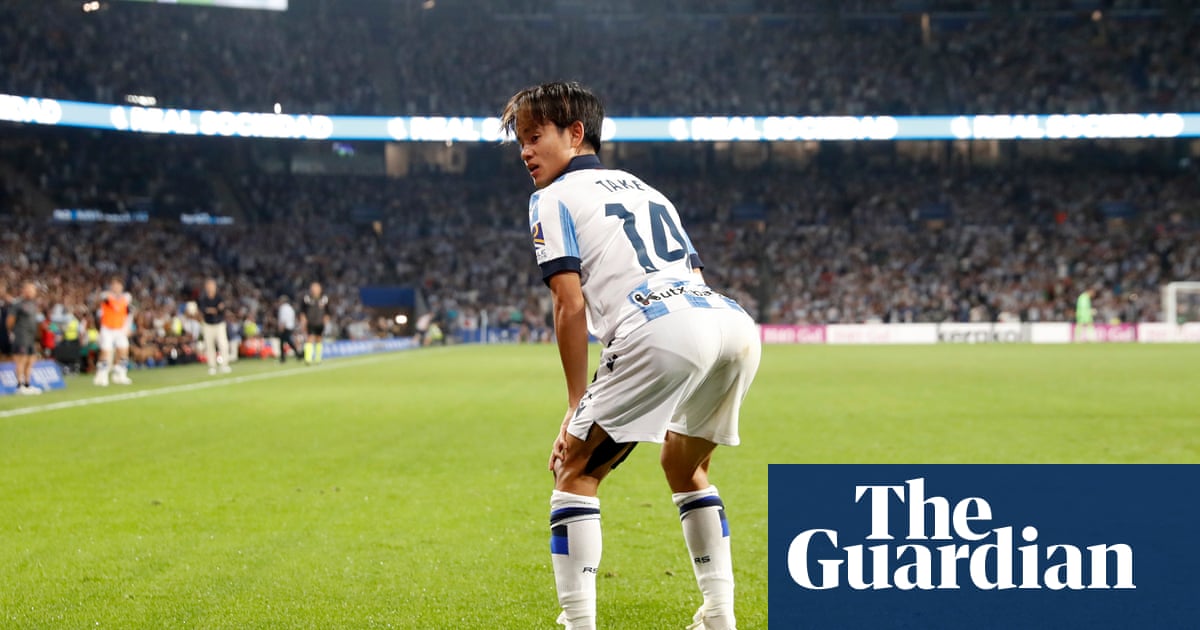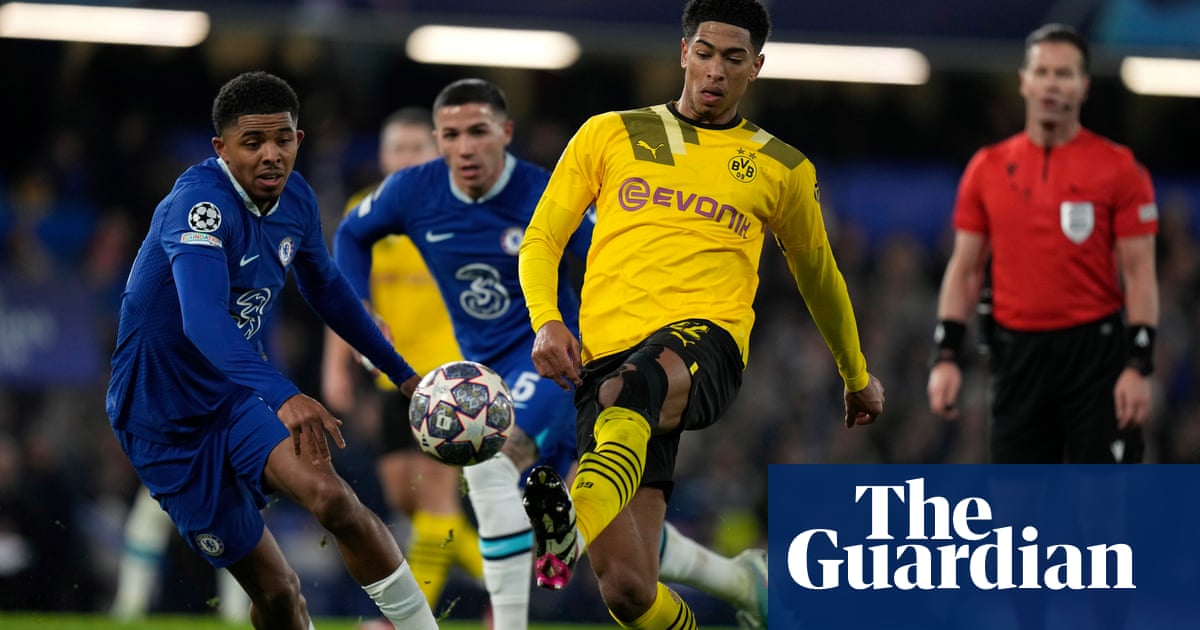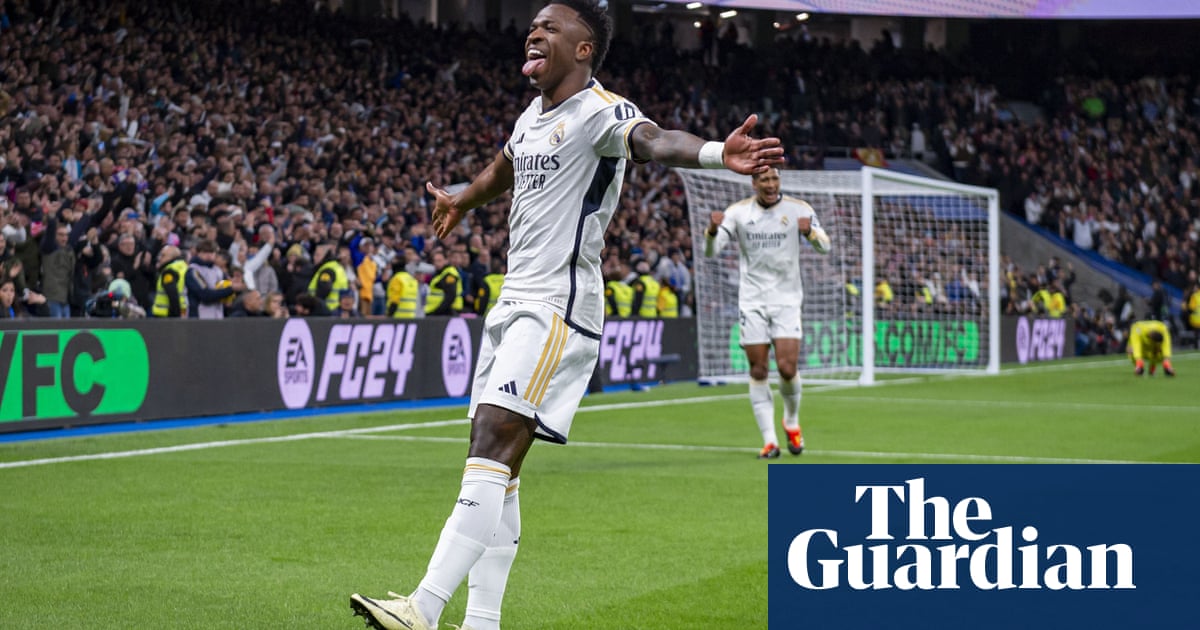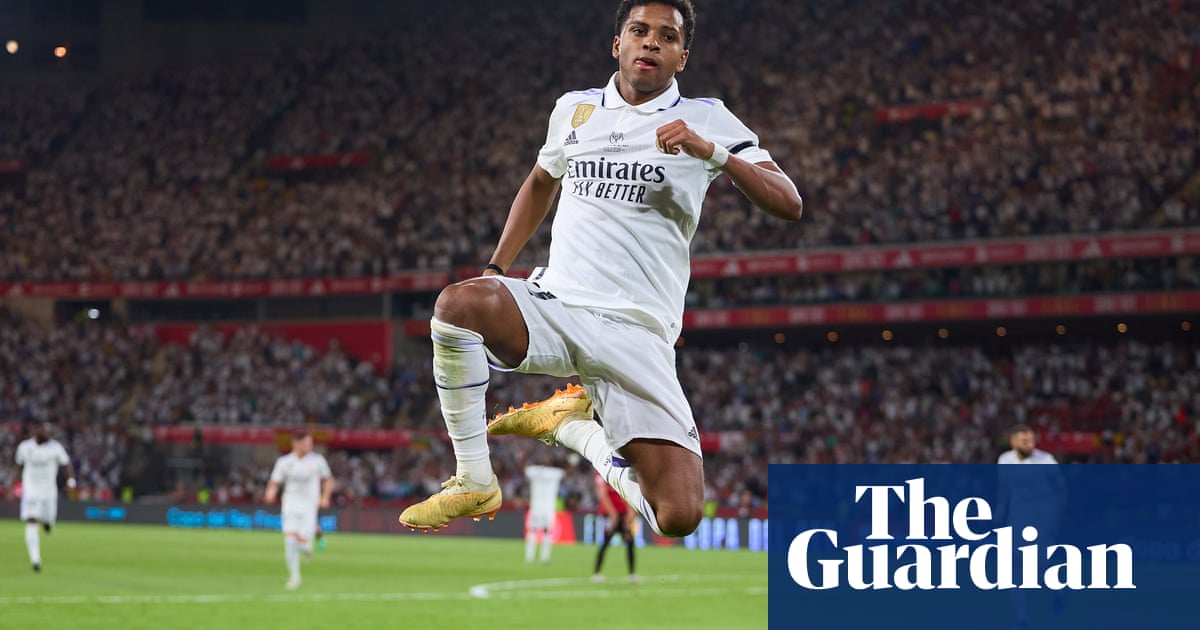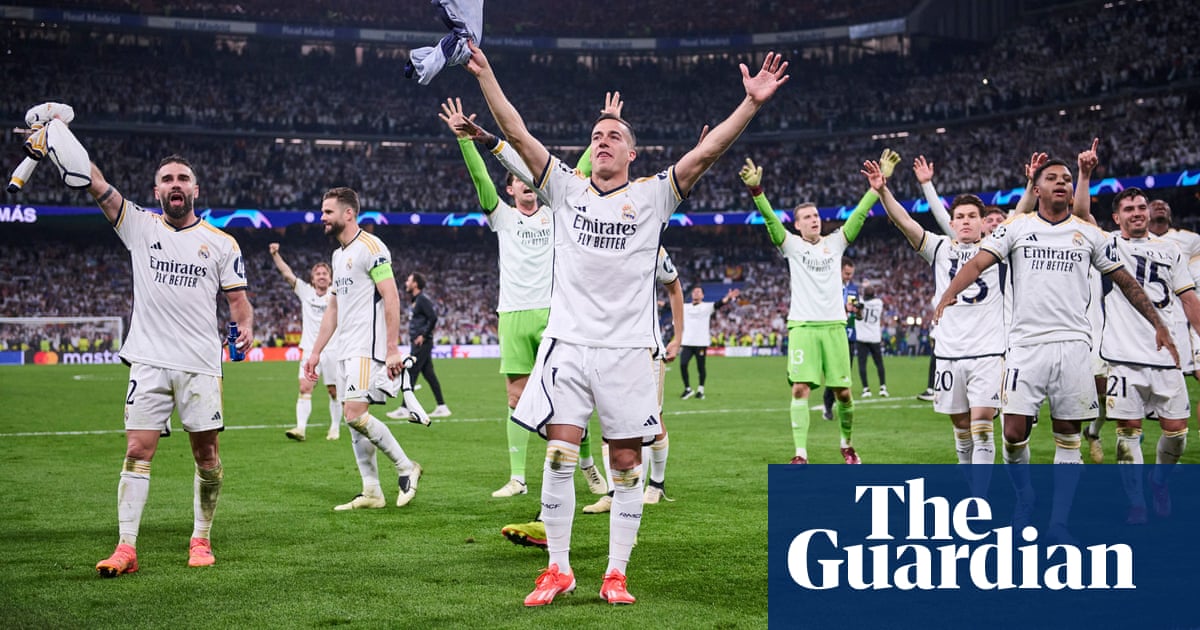
At some moment, somewhere amid the mayhem, that symbol of the ridiculousness of Real Madrid returned. The players who had just made another European Cup final had sprinted from one goal to the other, throwing themselves to the floor in front of their fans; Carlo Ancelotti had belted out the club’s anthem with its line about history made and history to be made, the coolest cat looking as if he was about to cry this time; and now they were doing a lap of honour. As they did so, Antonio Rüdiger briefly ducked out. When he came back, he was carrying a white plastic chair, stolen from a steward.
They were in front of the north stand at the Santiago Bernabéu, and Rüdiger handed it to David Alaba. One of three Madrid players to sustain a knee injury this season, Alaba has not played much and looked slightly embarrassed to be pushed centre stage but, Rüdiger insisted, this was about everyone and “the chair had to come back”. Alaba had raised it above his head like a trophy after Madrid’s comeback against Paris Saint-Germain in March 2022. He said he didn’t really know why but it had worked somehow – “Don’t you sit in our chair,” he had tweeted soon after, this throne theirs alone – and when he lifted it now everyone got it. They had only gone and done it again.
And again and again. PSG had been wild enough, but it turned out it was only the start. Then came Chelsea and Manchester City. Remember the on-screen graphic, the percentage chance of the teams going through? 99% City, 1% Madrid. Round here, they like those odds. Then came Liverpool in the final, Thibaut Courtois making more saves than anyone else, ever. Two years on, City again: City had 33 shots, nine on target, 18 corners, but it was Madrid that made it through on penalties, their back-up goalkeeper Andriy Lunin the hero. Now this. Asked to explain it, Ancelotti smiled and shrugged. “It happened again,” he said.
In Madrid’s five games in the knockout rounds before Wednesday night, their opponents had taken 93 shots – the total went above 100 here – and in each and every one had more shots on target than Ancelotti’s side. They had watched Leipzig’s Dani Olmo hit their bar in the last minute of the last 16, seen Erling Haaland hit it too.
This time, two goals in 164 seconds from the striker some remembered and many forgot from Stoke and Newcastle, the back-up brought on loan from second division Espanyol instead of buying, yes, Harry Kane, had taken Madrid from the edge of elimination to another final. Joselu Mato, the man born in Stuttgart, who made his league debut for Real Madrid in 2011 but didn’t get another chance for 13 years and didn’t get an international call-up from Spain until two days before his 33rd birthday, had seen off Bayern Munich.
“Joselu is a fantastic reflection of what this squad is,” Ancelotti remarked. Jude Bellingham said: “The professionalism of the players every day is incredible and it bears fruit, like with Joselu.” Bellingham calls Joselu “Peter Crouch” and now he was on his way to Wembley. “Crouchy”, asked if this was the best moment of his life, up there with getting married and the birth of his two children, replied: “Well, if you could put this [interview] out at 3am when my wife is asleep …” Two years ago, he had been to watch Madrid play the final against Liverpool in Paris. “This time I’ll experience it a bit closer up,” he said.
This was not something Joselu could have imagined – “My dreams are not this beautiful,” he said – and nor could the man he calls Jermain Defoe in return. “I don’t know why they send me out to do interviews when I don’t have the words,” Bellingham said. “I can’t believe it. I am grateful to be part of this team. I understand that the rest are calmer because they have more experience, but it’s my first time, in my first year. I am in shock.”
“Calm” may not be the word but there was something in that; some sense of trust in destiny, or whatever you want to call this, just sorting itself out somehow. Some faith, some belief, that fate will find a way. And even Bellingham must surely have got used to the idea. In his first season at Madrid, he has scored injury-time winners on four occasions. Two of them have been in clásicos. He has seen others do so too; not just playing for Madrid, but watching them, grateful to be on their side, able to experience the team that are inevitable, that have made the impossible feel unavoidable, the ridiculous routine, no story too silly.
Substitute on loan from the second division scores two in three touches, now has more semi-final goals than Kane, Haaland and Mbappé combined? Yeah, sounds about right.
“There have been lots of times when we seemed dead and buried, but our mentality means we never give it up for dead,” Bellingham said. “We have seen it lots of times this season.” The more it happens, the more it is likely to happen, a self-fulfilling prophecy played in the minds of the men on the pitch, playing for both teams, their fate everyone else’s fatalism. “Madrid never give up,” ran the banner unfolded before the game; “This is how Madrid win,” ran the chant at the end of it.
“This film looks familiar,” Luka Modric tweeted. Vinícius Júnior said: “This is Real Madrid. It’s a dream to play in this shirt and we always believe in ourselves.” That shrug from Ancelotti, the long pause and the smile, said more than he could. What, you seriously want me to try to analyse that? “It’s inexplicable, something magical,” the Italian said. “It has happened other times and it can’t be explained.” Jorge Valdano, the former player, coach and sporting director at Madrid, described this generation, about to play their sixth final in 12 years, as “making the stars align over and over again”.
For those who suffer them, and there are many, it feels like some sort of dark art, a pact with evil, some indestructible, inescapable bastardy, a voodoo. One example, among many: what is it they do to goalkeepers? Manuel Neuer suddenly, inexplicably, joined the list of the absurd: Sven Ulreich, Gianluigi Donnarumma, Loris Karius. If not so decisive, you might even add Édouard Mendy and Alisson to that.
Then there are the referees, and by the end of this semi-final that was what occupied Bayern. The referee, Szymon Marciniak, had blown for an offside that probably wasn’t just before Matthijs de Ligt had swept the ball past Lunin on 103 minutes and Thomas Tuchel was furious, literally shouting in the press conference. The linesman had apologised for raising the flag too early on the equaliser they thought they had scored, but that was worthless now, the Bayern manager said. “Everyone is suffering and living on the edge – the referees need to be at the level,” he said. De Ligt called the decision “a huge error and a huge disgrace”, “incredible”.
“These things happen a lot here; it happened to me in 2017 with two Cristiano Ronaldo goals,” Thomas Müller said. “Playing against Madrid is very strange.”
It also only ever ends one way, or at least that’s how it sometimes feels. Yet this was a bit different: this time, Madrid might have lost but they also might have won it sooner. If you’re looking for an explanation, there are the players they have and the performance they produced, the moments they can conjure up even when they are not at their best. Vinícius, in particular, was wonderful here, putting Joshua Kimmich through the spin cycle. “We had chances, control and the strength to not lose our heads when they scored,” Ancelotti said. This time they weren’t outshot or outplayed, even if they still needed an epic ending. In fact, for a while it seemed Bayern might be about to do what they do, if on a smaller scale.
But no one does Madrid like Madrid, and then came the error, from the goalkeeper who had made five saves. “If anyone didn’t deserve it, it was Manuel,” Tuchel said.
That night in 2017, Ancelotti had been on the other side. “Everyone saw what happened,” the then Bayern manager said. On the eve of this game, he was asked whether he felt he was on the good side now; by the end of it, there could be no doubt that he was. Ancelotti was in charge at Everton before he became Madrid’s manager for the second time almost by accident, the consequence of their struggle to find someone and a supposedly throwaway suggestion at the end of a phone call with them about something else. Now he is on course to become the best they have had, winner of their 10th European Cup, winner of their 14th too, and one game from the 15th.
It wasn’t supposed to be this way, but then that’s the best way. “I want to thank the fans and the players who have produced a season no one expected,” Ancelotti said. The season that could yet be the best of all, closing with a first visit to Wembley, had begun with their striker leaving, Karim Benzema departing ahead of schedule, and their goalkeeper Courtois and first-choice centre-back, Éder Militão, sustaining cruciate injuries. Then Alaba had fallen too, barely seen until Wednesday night when somewhere in the celebrations at the Santiago Bernabéu, Rüdiger took him his plastic chair, symbol of their success.




